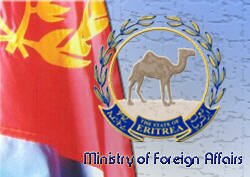 press release Asmara — The Security Council released a presidential statement on Somalia yesterday, 9 July 2009. The statement does not merit an elaborate response as the true facts surrounding the matter are well-known indeed. For the record, however, the factual and legal dimensions underpinning the whole episode are underlined bellow.
press release Asmara — The Security Council released a presidential statement on Somalia yesterday, 9 July 2009. The statement does not merit an elaborate response as the true facts surrounding the matter are well-known indeed. For the record, however, the factual and legal dimensions underpinning the whole episode are underlined bellow.
The Security Council does not possess providential authority. The Security Council is not above the law. The Security Council cannot supplant international law and the Charter of the United Nations. The Security Council cannot violate the sovereignty, territorial integrity, political independence, and unity of Somalia in an arbitrary manner. As such, the Security Council has no legal mandate or authority to dub as “legitimate” and impose a “government” whose writ is confined to few suburbs in the capital on the Somali people against their will.
In the same vein, the following simple questions can be raised:
Does the Security Council recognize governments established in “Somaliland”, “Puntland” or Kismayo as sovereign or transitional entities? If the Security Council does afford them its recognition, then what is the legal basis of its decisions? If it does not recognize them, what are the reasons?
What about the Security Council resolution 1725 (2006) passed on December 6, 2006, which calls for ” respect for the sovereignty, territorial integrity, political independence, and unity of Somalia”?
The Government and People of Eritrea have not recognized, do not recognize and will not recognize any government that is externally imposed on Somalia against the choice of the Somali people and in contravention of international law as well as the Charter of the United Nations.
In the event, the statement outwardly sponsored by the United Kingdom and Uganda and released in the name of presidency of the Security Council is
Instead of making statements that contradict each other and that are predicated on multiple standards which subsequently diminish its stature, the Security Council should have taken commensurate legal action against all those who prolong and exacerbate the suffering of the Somali people, and, the parties that are destabilizing the Horn of Africa region.
Indeed, the Security Council should have supported a genuine political process that is not encumbered by external interferences and that respects the choice of the whole Somali people in “Somaliland”, “Puntland”, Kismayo and other parts of Somalia as well as the Diaspora rather than postponing the solution time and again or seeking scapegoats to cover its failure.
Ministry of Foreign Affairs
Asmara






